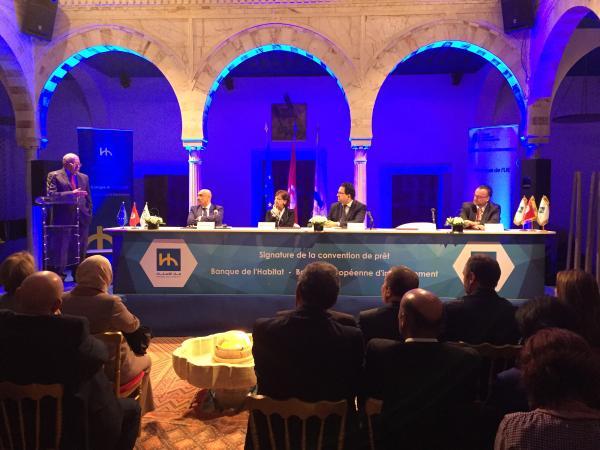
This new credit line with Banque de l’Habitat will enable the European Investment Bank (EIB) to strengthen businesses’ access to bank financing, underpinning over 250 small and medium-sized enterprises (SMEs) and more than 1 600 jobs in Tunisia. This large-scale financing operation is the EIB's first in support of a Tunisian public bank since 2012.
The EUR 120m finance contract was signed today in Tunis by Mr Ahmed Rjiba, CEO of Banque de l’Habitat (BH) and Ms Flavia Palanza, the EIB's Director of Operations in Neighbouring Countries in the presence of Finance Minister H.E. Ridha Chalghoum and Minister of Development, Investment and International Cooperation H.E. Zied Ladhari, who also signed the guarantee agreement to secure this loan on behalf of the Tunisian Government.
Granted on favourable terms with regard to the maturity and interest rate, this financing operation will help to significantly improve the project promoters’ lending terms whilst helping to consolidate the banking sector by diversifying the sources of finance and cutting financing costs. The loan is aimed primarily at SMEs but also at micro, small and medium-sized enterprises (MSMEs) that add value and create jobs. Civil society is also set to play a key role under this financing agreement to more effectively raise awareness and provide support to the businesses financed.
This new credit line will be centred on financing projects in a variety of industrial and services sectors, e.g. information and communications technology (ICT), public and private healthcare, pharmaceuticals, education, cultural activities and agrifood, not to mention the energy sector including renewable energy and energy efficiency. Particular emphasis will be placed on exports and access to new external markets.
“This financing reflects our commitment to Tunisia's public banks, which will help speed up businesses’ access to financing”, said Ms Palanza, the EIB's Director of Operations in Neighbouring Countries. “I am especially pleased to sign this new financing operation with Banque de l’Habitat, a bank with which we have a long-standing relationship through a high-quality partnership based on trust. By giving small project promoters as well as larger businesses the means to develop, we are supporting local jobs and economic growth – two of the EIB’s main priorities – in Tunisia. This new credit line involving civil society sends a strong signal to MSMEs and opens up new employment opportunities for young people in Tunisia.”
“Banque de l’Habitat is particularly proud and delighted to sign this credit line, which shows the EIB’s confidence in Tunisia and in our bank”, stated Mr Rjiba, CEO of BH. “It also illustrates a prestigious and rigorous European financial institution's recognition of BH's performance, particularly the progress that we have made in implementing our restructuring programme. This continues our close cooperation with the EIB, which began 22 years ago. It enables us to step up our support for the domestic economy, SMEs and job creation. This loan will also help to consolidate our long-term funding and will make a valuable contribution to our business plan for the period 2017-2021. The loan is undoubtedly the starting point for developing other avenues of collaboration.” Mr Rjiba also highlighted the significance of the fact that the Tunisian Government has secured this loan, confirming yet again the bank’s accomplishment as a true model of public-private partnership.
This EIB financing operation comes under the Neighbourhood Policy of the European Union, whose support for the development and competitiveness of businesses is a central plank of its activity. It is also consistent with the priorities of the Economic Resilience Initiative launched by the EIB in support of job creation and the financial inclusion of small and medium-sized enterprises in countries impacted by the refugee crisis.
As the leading international development financer in Tunisia, the EIB pledged at the “Tunisia 2020” international conference in November 2016 to support the transition of Tunisia to the tune of up to EUR 2.5bn by 2020. Support for the private sector and entrepreneurship is at the heart of this exceptional effort designed to promote inclusive and sustainable growth, which leads to jobs for young people.


